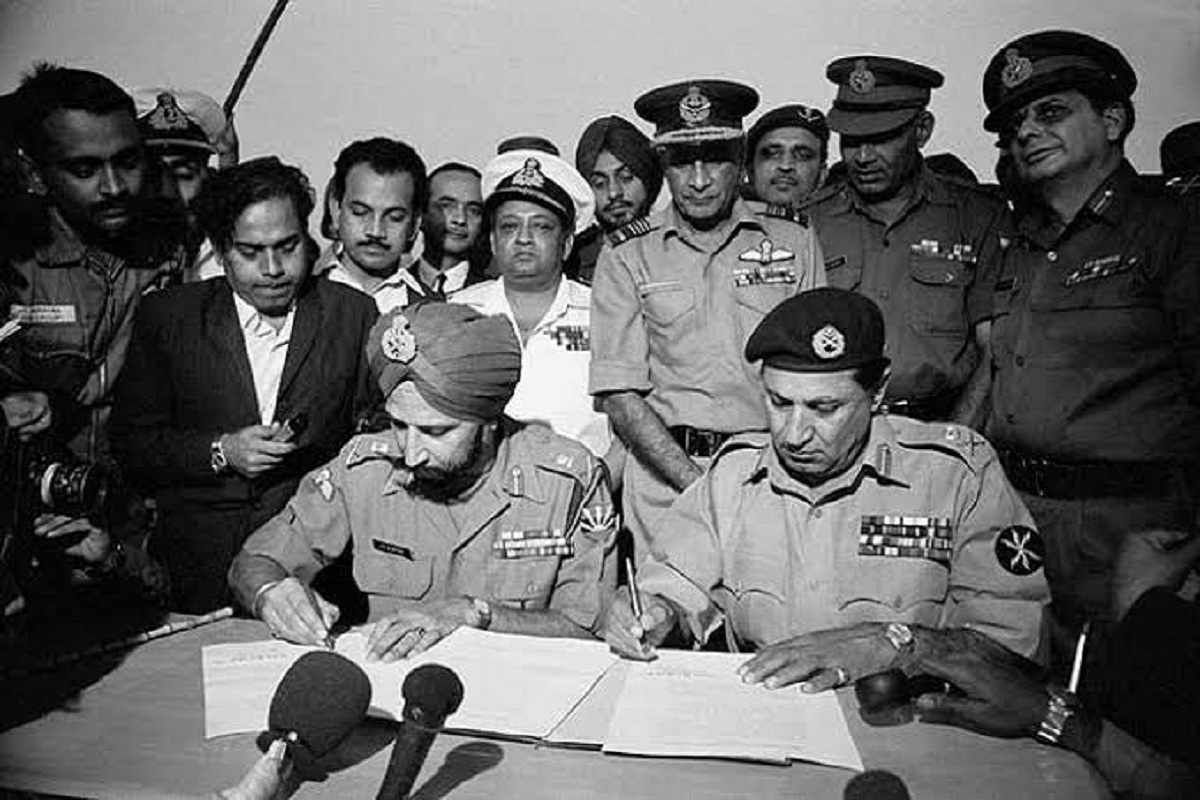As India and Bangladesh celebrate the 51st anniversary of their victory over the Pakistan army on 16 December 1971, that nation continues to attempt to exorcise the ghost of defeat.
As recently as last month, Pakistan’s former army chief General Bajwa blamed the defeat on ‘political failures and not military,’ only to be rebuked by foreign minister Bilawal Bhutto, who stated that all decisions leading to and during the war were taken by the military dictatorship headed by Yahya Khan.
Bajwa added that only 34,000 military personnel were present, whereas records state that the number of the uniformed who surrendered were almost 80,000.
Pakistan failed due to multiple causes, least of which was the distance between its western and eastern wings. There is no doubt that there were differences between the two Pakistans, including language, culture, and economy.
The rulers in West Pakistan made no attempt to bridge the differences, instead considered their brethren in East Pakistan as inferior, refusing to even include Bangla as one of the national languages.
East Pakistanis felt that though they contributed much more to the economy, they received far less in return. Anger built up in 1970 when it was ignored after being struck by the ‘Bhola’ cyclone which killed over 50,000 and devastated vast stretches of land.
A major cause for Pakistan’s defeat in 1971 was its army adopting a barbaric approach to quell an uprising which arose due to the west ignoring its eastern populace as also refusing to politically accommodate them. The West Pakistan leadership assumed that the Bengalis of East Pakistan could not be trusted. This led to resentment amongst the Bengalis who voluntarily fought back against the oppressors.
Angering the local populace opened doors to defeat by India. The Indian army, in its offensive, was guided by local fighters who also provided them with valuable intelligence. Pakistan had sealed its own fate by launching the crackdown.
Secondly, the Pakistan leadership was so enamoured by Nixon and Kissinger that they were certain that any Indian gains would be offset by military action of the US. Pakistan was then acting as a conduit for building US-China ties. They were certain that the US seventh fleet would sail into the Bay of Bengal and stall any Indian victory. However, that did not happen due to multiple reasons, mainly because of the Indo-Russia agreement.
Pakistan also banked on China applying pressure on India’s northern and eastern borders. None of what Pakistan had hoped for occurred. Left alone, the Pakistani leadership knew defeat was inevitable. Over-dependence on allies should never have been part of their strategy.
Another major strategic blunder by Pakistan was commencing a war against India seeking to relieve the pressure on East Pakistan. It was illprepared for the same and achieved nothing but further loss. Ahmed Faruqui writes in Pakistan’s Daily Times, “Poor planning; indecision about deployment; hasty and countermanded regrouping; inadequate or even non-existent coordination between formations; inability to seize the moment for exploitation; lack of cooperation between GHQ and air HQ; bungling of movement control procedures — the list of failures (in its operations against India on its Eastern borders) is long.”
Pakistan had failed to learn from 1965. A nation with an absolute dictator as a leader, with no advisor to render sane advice, is a recipe for disaster. Hitler was an example.
That was the state of Yahya Khan, the chief martial law administrator and army chief of Pakistan. It was on his sole insistence that the Pakistan army launched Operation Searchlight in March 1971, which signalled the collapse of the state. The then Governor of East Pakistan, Admiral SM Ahsan, and Lt General Yaqub Khan, Commander of Eastern Command in Dhaka were recalled for questioning Yahya Khan’s decisions.
The Pakistan leadership had never considered that for India, creating Bangladesh was essential for its security. Had they understood the Indian intent, they would have concentrated on defending Dacca and deploying additional forces to prevent its fall. India’s probing actions drew out the Pakistan army, exposing Dacca. Indian military build-up and preparations for the war were visible but Yahya, lost in his inebriated state, did nothing.
He banked on multiple external factors for support, unaware that they may not appear when most needed. An internal turmoil will always be exploited by adversarial states. India, which had always been concerned about Pakistan using both its flanks strategically, took advantage of the scenario. It had prepared well for operations though it was not expecting complete success in such a short duration.
The intelligence provided by the Mukti Bahini was exceptional. The surrender by the Pakistan army under Lt Gen AAK Niazi in just 14 days was remarkable. Despite US backing, Pakistan failed to garner global support, a sign of poor diplomacy. Indian PM Indira Gandhi had travelled to a number of countries describing atrocities committed by the Pakistan army. In addition, India had the backing of Russia in the UNSC.
Pakistan’s leadership began raising the issue of Indian intervention rather late and could not defend their atrocities. Ultimately it was an Indian victory in every sphere. The defeat left a mark on the Pakistan army which can never be erased. General Musharraf had attempted to regain Pakistan army’s glory when he launched his troops to occupy the heights in Kargil in 1999.
He had hoped that success there would reverse the defeat of 1971. It was not to be. Indian forces suffered losses but ensured that they regained the heights. Pakistan had to suffer defeat once again. Such was their ignominy that they even refused to acknowledge their dead soldiers, many of whom remain buried in the icy heights.
There is no doubt that possession of nuclear weapons has changed the environment. Victory as in 1971 may not be repeated as the nuclear threat looms large and world opinion has changed. However, in case Pakistan continues to treat its areas (Baluchistan and Khyber Pakhtunkhwa) as it treated East Pakistan, it may face an uprising far worse than that launched by the Mukti Bahini. It appears Pakistan has yet to learn from its failures.










